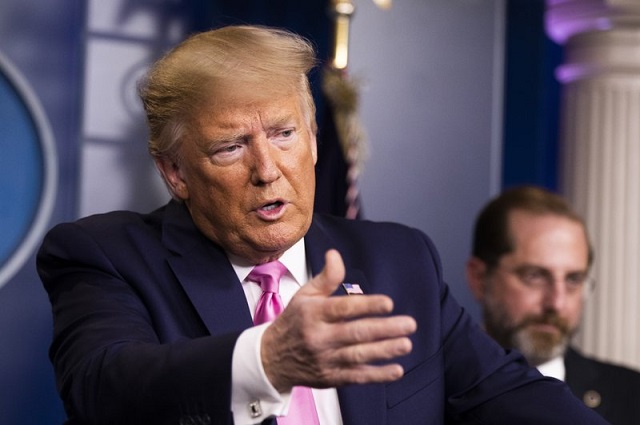
Washington, United States | AFP | Can Donald Trump refuse to turn over his tax returns and financial records to Congress and New York prosecutors? The Supreme Court takes up this politically charged question on Tuesday, and it may use the occasion to better define the limits of presidential immunity.
The high court’s nine justices, confined at home by the novel coronavirus pandemic, will question lawyers for both sides by telephone in a highly anticipated session to be broadcast live.
The hearing, initially set for late March, is being held now to allow time for the justices to render a decision before the presidential election in November, as Trump seeks a second term.
The former real estate magnate, who used his fortune as an argument in his 2016 election campaign, is the first president since Richard Nixon in the 1970s to refuse to release his tax returns — prompting speculation about his true worth and his possible financial entanglements.
“There is clearly something in these documents that the president does not want us to see,” Steven Mazie, an author and educator, said during a webinar.
Since retaking control of the House of Representatives in midterm elections in 2018, the Democratic opposition has been eager to find out just what that “something” might be.
Several congressional committees have issued subpoenas to Trump’s longtime accounting firm, Mazars, as well as to Deutsche Bank and Capital One bank, demanding Trump’s financial records for the 2011-2018 period.
Manhattan prosecutor Cyrus Vance, a Democrat, meantime made a similar demand to Mazars as part of an investigation into payments to the porn actress known as Stormy Daniels to buy her silence about an alleged liaison with the billionaire.
Trump immediately sued to block the documents’ release.
“What they are doing is not legal,” he said on Twitter, adding, “the Witch Hunt continues.”
Having lost his argument in the lower courts, Trump turned to the nation’s highest legal body. With two conservative Trump appointees on the nine-justice panel, the high court has taken a clear turn to the right.
– ‘To torment the president’ –
The justices will devote the first hour of Tuesday’s oral arguments to the congressional subpoenas, highlighting a fierce battle over the legislature’s investigative powers.
“Unleashing each and every House committee to torment the president with legislative subpoena after legislative subpoena is a recipe for constitutional crisis,” the president’s lawyers said in a brief to the court.
Yet such requests are nothing new, House lawyers responded in their own brief, citing examples involving presidents Richard Nixon, a Republican, and Jimmy Carter, a Democrat.
“What is unprecedented,” they added, “is the extraordinary breadth of the arguments that President Trump and the solicitor general make about the supposed power of a president to thwart investigations.”
The high court may be tempted to sidestep the central issue. In late April, it asked both sides to respond in writing to the question of whether the matter was political and not legal in nature. If the former is true, justices can close the file without taking a position.
“No,” both sides said on Friday, clearly hoping for resolution by the high court.
– Murder on Fifth Avenue –
In a second phase of Tuesday’s session, the justices will take up the case involving the Manhattan prosecutor, which raises the critical question of the extent of presidential immunity before the law.
Trump’s attorneys argue that a president enjoys total immunity so long as he is in the White House.
One Trump lawyer even argued before an appeals court that Trump could shoot someone dead on New York’s Fifth Avenue and face no legal penalty — while in office.
“Nothing could be done?” a skeptical judge asked.
“That is correct,” the president’s attorney replied.
To Trump’s legal team, the need for immunity is “particularly acute when it comes to state and local prosecutors.”
“The president must be allowed to execute his official functions without fear that a state or locality will use criminal process to register their dissatisfaction with his performance,” they wrote in their brief.
But law professors Claire Finkelstein and Richard Painter say this vision is contradicted by the record of the Supreme Court itself. The high court required Richard Nixon to turn over secret White House recordings to the special prosecutor investigating the Watergate scandal.
The two professors added in a friend-of-the-court brief that an expansive interpretation of presidential immunity poses a “grave threat to the rule of law.”
If the Supreme Court accepts the Trump team’s arguments, they added, “it will fundamentally alter the basic principles of accountability on which our democracy depends.”
 The Independent Uganda: You get the Truth we Pay the Price
The Independent Uganda: You get the Truth we Pay the Price



